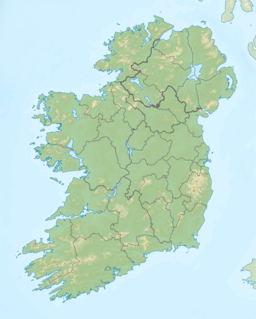Lough Beagh
| Lough Beagh | |
|---|---|
| Loch Ghleann Bheatha Error {{native name checker}}: parameter value is malformed (help) | |
 | |
| Location | County Donegal |
| Coordinates | 55°2′24″N 7°58′22″W / 55.04000°N 7.97278°W |
| Lake type | Glacial lake |
| Primary inflows | Owenbeagh River |
| Primary outflows | Owencarrow River |
| Catchment area | 36.88 km2 (14.2 sq mi) |
| Basin countries | Ireland |
| Max. length | 6.5 km (4 mi) |
| Max. width | 0.8 km (0.5 mi) |
| Surface area | 2.61 km2 (1.01 sq mi) |
| Average depth | 9.2 m (30 ft) |
| Max. depth | 46.5 m (153 ft) |
| Surface elevation | 45.3 m (149 ft) |
| References | [1][2][3] |
Lough Beagh (Irish: Loch Ghleann Bheatha),[4] also known as Lough Veagh, is a freshwater lake in the northwest of Ireland. It is located in north County Donegal and is part of Glenveagh National Park.
Geography
Lough Beagh is about 24 kilometres (15 mi) northwest of Letterkenny.[3] It measures about 6 km (3.7 mi) long and 1 km (0.6 mi) wide and lies in the narrow Glenveagh valley surrounded by the Derryveagh and Glendowan Mountains.[3] Steep granite cliffs rise on both sides of the lake to heights of about 300 m (1,000 ft).[2] The lake has numerous small islands at its northern end.[5]
Hydrology
Lough Beagh is fed mainly by the Owenbeagh River entering at its southern end. The lake drains northwards into the Owencarrow River. The Owencarrow connects the lake with its similar northern neighbour, Glen Lough.[2]
Natural history
Fish species in Lough Beagh include brown trout (including sea trout), Arctic char, salmon, minnow and the critically endangered European eel.[3] Bird life includes the migrating red-throated diver and the reintroduced golden eagle.[6]
History
The lake is mentioned in the Annals of the Four Masters, where in about 1540 sons of Ó Domnaill "held the crannog of Loch Veagh and from it were greatly troubling the country".[7]
See also
References
- ^ "A Reference Based Typology and Ecological Assessment System for Irish Lakes" (PDF). Environmental Protection Agency (Ireland). 2006. p. 13. Retrieved 13 Aug 2015.
- ^ a b c "Explanatory Memoir" (PDF). Irish historical geological maps. Geological Survey of Ireland. 1891. p. 12. Retrieved 13 Aug 2015.
- ^ a b c d "Water Framework Directive Fish Stock Survey of Lough Beagh" (PDF). Inland Fisheries Ireland. August 2011. Retrieved 13 Aug 2015.
- ^ "Loch Ghleann Bheatha/Lough Beagh". Placenames Database of Ireland. Government of Ireland - Department of Arts, Heritage and the Gaeltacht and Dublin City University. Retrieved 13 Aug 2015.
- ^ "Lough Beagh" (Map). Google Maps. Retrieved 13 Aug 2015.
- ^ "Glenveagh National Park - Wildlife". National Parks and Wildlife Service (Ireland). Archived from the original on 2015-09-05. Retrieved 13 Aug 2015.
- ^ O'Donovan, John, ed. (1856). Annála Rioghachta Éireann. Annals of the Kingdom of Ireland by the Four Masters ... with a Translation and Copious Notes. 7 vols. Translated by O'Donovan (2nd ed.). Dublin: Royal Irish Academy. 1540.11 CELT editions. Full scans at Internet Archive: Vol. 1; Vol. 2; Vol. 3; Vol. 4; Vol. 5; Vol. 6; Indices.
External links
 Media related to Loch Gleann Bheatha at Wikimedia Commons
Media related to Loch Gleann Bheatha at Wikimedia Commons

